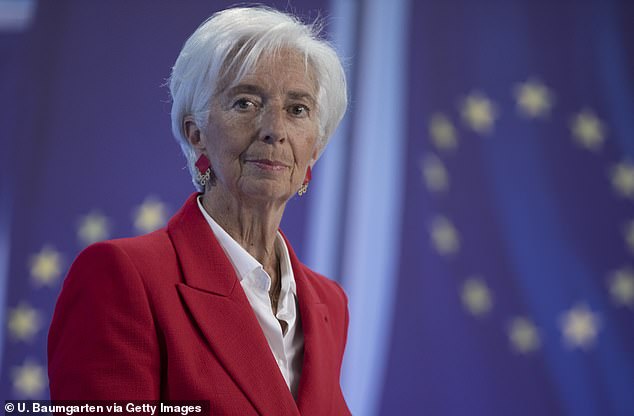Christine Lagarde has never been short of ambition, as her translation from French finance minister to head of the IMF and now president of the European Central Bank (ECB) demonstrates.
The ECB chief’s latest target is to end the also-ran status of the euro as a reserve currency. Her aim is to displace the dominance of the dollar, which represents 58 per cent of foreign currency reserves, with the euro which accounts for around 20 per cent.
Lagarde recognises that the EU may not be trusted until it completes the single market, reduces regulatory burdens and builds a robust union of capital markets.
In Europe’s favour, largely thanks to Germany, is the EU-wide debt-to-GDP ratio of 89 per cent against 100 per cent in the UK and 124 per cent and rising in the United States.
Lagarde’s demarche comes at a moment of high tension for the guardians of the dollar at the US central bank, the Federal Reserve. It began a two-day interest rate setting session yesterday under fire.
Donald Trump’s tariff mayhem and a so far ill-fated effort at securing world peace have been dominating headlines.

Plan: European Central Bank chief Christine Lagarde’s latest target is to end the also run status of the euro as a reserve currency
The US President’s unrelenting attacks on the Fed’s chairman Jay Powell have been under the radar but may inadvertently be holding up the very interest rate cuts Trump craves.
Ideally, American interest setters might want to lower the official federal funds rate from its current range of 4.25 per cent to 4.5 per cent.
But to do so might give the impression to markets, businesses and consumers that the central bank is vulnerable to political pressure and not serious about hitting a 2 per cent inflation target.
We shouldn’t underestimate the pressure on Powell.
Using disobliging language, the Fed chairman variously has been described by Trump as a ‘loser’ and a ‘numbskull’ for not bringing rates down more quickly to facilitate growth.
Indeed, the president has gone as far as to name a preferred successor, Fed governor Kevin Warsh. He is a critic of central bank mission creep beyond its monetary role of fighting inflation.
It is not just Trump who is gunning for the Fed. Texas Senator Ted Cruz, a potential Republican presidential candidate in 2028, advocates a halt to the Fed’s practice of paying interest rate on its reserves.
This policy gobbled up $280billion in 2023 and has cost as much as a trillion dollars over a decade.
The approach is sometimes given a run-out in Britain with Reform among those suggesting that cancelling the Bank of England payouts could save £35billion of interest rate bills a year.
The Fed has good reason to be cautious irrespective of political pressure. Core inflation and the US central bank’s preferred data, the personal consumption expenditure index, are both running above the 2.5 per cent target.
The ongoing tariff war threatens to raise domestic prices as the levy is passed onto consumers.
The current Israel-Iran war raises the prospect of higher energy prices ahead of the summer driving season.
Andrew Bailey, the governor of the Bank of England, is fortunate that former junior colleague Rachel Reeves is not throwing Trump-style brickbats at the central bank.
It is irksome that Reeves defends her stewardship of the economy by referring to the four quarter-of-a-percentage point reductions in the bank rate since Labour took office 11 months ago.
That is a far milder aspersion on the Bank’s independence than anything heard in America. Reeves’ botched budgetary decisions fly in the face of an assertion that fiscal policy created the stability that allowed borrowing costs to fall.
Freed from such pressures, Lagarde has been able to guide EU rates down and at 2 per cent they are now half those in the US and UK.
Europe’s moribund economies need a boost as they retool for a greener energy future. But it is a big jump for the euro from distant second to be being a favoured reserve currency.
After all, the dollar is the currency of commodities and global trade. It is also able to finance a bigger deficit than the EU because of the resilience of the American economy, which can grow its way out of difficulty. Too soon to sound the last post for the greenback.

AJ Bell

AJ Bell
Easy investing and ready-made portfolios

Hargreaves Lansdown

Hargreaves Lansdown
Free fund dealing and investment ideas

interactive investor

interactive investor
Flat-fee investing from £4.99 per month

InvestEngine

InvestEngine
Account and trading fee-free ETF investing
Trading 212
Trading 212
Free share dealing and no account fee
Affiliate links: If you take out a product This is Money may earn a commission. These deals are chosen by our editorial team, as we think they are worth highlighting. This does not affect our editorial independence.